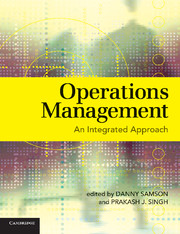Book contents
- Frontmatter
- Contents
- List of Contributors
- Preface
- Acknowledgements
- Part I Operations within Organisations – Building Blocks
- Part II Approaches to Understanding OM
- Part III Moving Forward with OM – Creating Competitive Advantage
- Part IV Challenges and Opportunities in Operations
- 11 Managing Risk in Operations
- 12 Sustainability in Operations Management
- 13 Operations Management in Different Settings
- Part V Case Studies
- Index
- References
12 - Sustainability in Operations Management
Published online by Cambridge University Press: 05 June 2012
- Frontmatter
- Contents
- List of Contributors
- Preface
- Acknowledgements
- Part I Operations within Organisations – Building Blocks
- Part II Approaches to Understanding OM
- Part III Moving Forward with OM – Creating Competitive Advantage
- Part IV Challenges and Opportunities in Operations
- 11 Managing Risk in Operations
- 12 Sustainability in Operations Management
- 13 Operations Management in Different Settings
- Part V Case Studies
- Index
- References
Summary
Learning objectives
After reading this chapter you should be able to:
define what sustainability is, and how it applies in the context of an organisation and its operations
explain why organisations are taking greater account of sustainability
describe how sustainability initiatives and long-term organisational performance are connected
describe organisations' approach to sustainability and the important role that operations management can play
describe how new capabilities in operations management can contribute to sustainability and gain unique strategic advantages for the organisation
appreciate how concepts of sustainability can and should be integrated into all operations managers' decisions and actions.
Box 12.1: Management challenge: sustainability lessons for BHP
In 1999, Broken Hill Proprietary Ltd (BHP) reported a massive A$2.3 billion dollar loss. Only four years earlier, the company's profit had been A$1.2 billion. The huge downward slide resulted from a number of poor decisions including failed development projects, over-priced acquisitions and a chronic environmental problem at the Ok Tedi copper and gold mine in Papua New Guinea.
BHP's shareholders were outraged and the company quickly learned some hard lessons. Perhaps the most profound of these was that the company's access to exploration and mining sites – its ‘licence to operate’ – could be threatened if it failed to nurture the support of the communities and governments of the countries in which it operates. […]
- Type
- Chapter
- Information
- Operations ManagementAn Integrated Approach, pp. 351 - 380Publisher: Cambridge University PressPrint publication year: 2008

